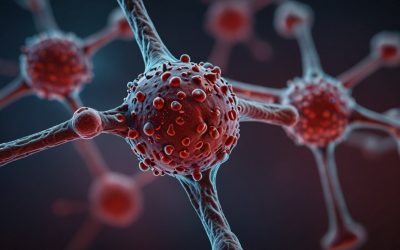Your body’s response to unwelcome guests—often seen as inflammation—can sometimes throw a friendly fire in the complex web of your immune system, leading to autoimmune disorders. It’s a delicate balance that your body maintains, and when it’s disrupted, you might find yourself in the crossfire, manifesting as one of the many chronic conditions that affect millions globally. As you navigate through the intricacies of how an overzealous immune response can turn your own defenses against you, you’ll uncover the intricate connections between the silent roar of inflammation and the onset of autoimmune diseases such as lupus, rheumatoid arthritis, and multiple sclerosis. Bear in mind that this journey is not just about understanding the hows and whys; it’s also about exploring new frontiers in treatment and prevention. What’s at stake is nothing less than your well-being, and the knowledge you gain could be the key to unlocking the doors to innovative therapeutic strategies.
Key Takeaways
- Inflammation acts as the body’s alarm system, but misdirected inflammation can lead to autoimmune disorders.
- Different autoimmune diseases have unique inflammatory profiles.
- Understanding regulatory mechanisms is crucial in preventing and mitigating autoimmune disorders.
- Aberrant inflammatory responses play a pivotal role in the onset and progression of autoimmune disorders.
Understanding Inflammation
Inflammation acts as your body’s alarm system, swiftly responding to infection and injury to initiate healing, but when misdirected, it can trigger the cascade of events leading to autoimmune disorders. Your immune system typically functions to protect you from pathogens and helps repair damaged tissues. However, in autoimmune conditions, an abnormal immune response prompts your own cells to produce inflammatory signals against healthy tissues, mistakenly treating them as foreign invaders.
This inappropriate response can manifest in various autoimmune diseases, each characterized by a unique inflammatory profile. For instance, rheumatoid arthritis involves the relentless attack on joint linings, while systemic lupus erythematosus is marked by inflammation affecting multiple organs. Inflammatory bowel disease targets the gastrointestinal tract, and in cases like diabetes, the inflammation can destroy insulin-producing cells in the pancreas.
Understanding the regulatory mechanisms that govern inflammation is pivotal in creating interventions that can prevent or mitigate these disorders. Each condition exhibits a complex interplay of genetic predispositions, environmental triggers, and dysregulated immune responses. By comprehensively studying these factors, researchers aim to delineate the pathways through which inflammation becomes chronic and destructive.
In the context of autoimmune diseases, the challenge lies in discerning how to modulate the immune system in a way that curtails the inflammatory disease process without compromising the body’s ability to fend off genuine threats. Your commitment to serving those affected by these conditions is supported by the deepening understanding of the intricate balance required to maintain immune homeostasis. This knowledge is crucial for developing targeted therapies that can correct the abnormal immune response and provide relief to those suffering from autoimmune conditions.
Autoimmune Disorders Explained

Why does your immune system, the very sentinel meant to safeguard your health, turn against you in autoimmune diseases? The complexity of these conditions lies in the intricate dance of your immune system’s components, where a misstep can lead to a relentless attack on your own body.
Consider these critical points:
- Immune System Misdirection: T cells and B cells, which typically defend against pathogens, may erroneously identify your own tissues as foreign, leading to the production of antibodies that perpetuate an attack. This self-directed aggression is the hallmark of autoimmune diseases.
- Chronic Inflammatory Response: In autoimmune disorders, your body’s immune response is not a short-lived event but a persistent state. An abnormal inflammatory response damages tissues, a characteristic feature of chronic conditions like rheumatoid arthritis and lupus.
- Regulatory Malfunction: The immune system contains checks and balances, such as regulatory T cells, meant to prevent autoimmune reactions. When these fail, the unbridled immune system attacking your own cells becomes a reality.
The enigma of why the immune system turns traitorous is grounded in the causes of autoimmune disorders, which are multifaceted and not yet fully understood. Genetic predispositions, environmental factors, and even certain infections can precipitate these diseases. Moreover, epigenetic changes, like methylation and histone acetylation, modulate gene expression, potentially leading to the misguided immune response seen in autoimmune diseases.
You’re in a pivotal position to contribute to the well-being of others by understanding these mechanisms. By dissecting the science behind autoimmune disorders, you can better support those living with these chronic conditions, offering insight, care, and hope.
Inflammation’s Role in Autoimmunity

Delving into the complexities of autoimmunity, it’s essential to understand that aberrant inflammatory responses play a pivotal role in the onset and progression of such disorders. When the immune system mistakenly identifies the body’s own tissues as foreign, it mounts an attack that causes inflammation, leading to tissue damage and symptomatic flare-ups in autoimmune diseases.
Understanding the role of various immune cells like T cells, B cells, and monocytes/macrophages is crucial, as they are the orchestrators of inflammation in autoimmune conditions. For example, in patients with rheumatoid arthritis (RA), the immune system’s T cells and B cells interact inappropriately, leading to chronic inflammation and joint damage. Similarly, in systemic lupus erythematosus (SLE), antibodies attack the body’s own cells, causing widespread inflammation and organ involvement.
Here’s a table summarizing the roles of specific immune cells and mechanisms in autoimmune diseases:
| Immune Cell/Mechanism | Autoimmune Disease | Role in Development |
|---|---|---|
| T cell | RA, SLE | Initiates inflammatory responses, helps B cells produce autoantibodies |
| B cell | RA, SLE | Produces autoantibodies that target self-tissues |
| Monocytes/Macrophages | RA, IBD | Releases inflammatory cytokines, perpetuating tissue damage |
| Epigenetic Mechanisms | Various | Modifies gene expression, influencing inflammation |
Epigenetic mechanisms also contribute to the onset of autoimmune diseases by regulating genes that control inflammatory responses. As you serve individuals grappling with these conditions, it’s imperative to appreciate the significance of inflammation’s role in autoimmunity. Insight into these mechanisms can pave the way for targeted therapies that ameliorate the inflammatory aspect of these debilitating diseases.
Identifying Triggers and Symptoms
Understanding the cellular mechanisms driving autoimmune conditions, it’s equally vital to recognize the external and internal factors that trigger symptomatic flare-ups and identify early signs of disease. Your immune system, designed to protect your body, can mistakenly target your own tissues in autoimmune diseases, leading to inflammation and tissue damage.
To effectively serve those afflicted with autoimmune disorders, such as arthritis, it’s crucial to discern the onset of symptoms and potential triggers. Here are some key points:
- Persistent Pain and Swelling: Continuous discomfort and inflammation in joints may indicate the activation of immune cells against your body’s own tissues. It’s essential to recognize these early signs and seek medical advice to prevent further damage.
- Environmental and Lifestyle Factors: Stress, diet, and exposure to specific environmental agents can act as triggers. Observing how these factors correlate with symptom flare-ups can guide you in managing and potentially mitigating the harmful effects of immune responses.
- Genetic Predisposition: A family history of autoimmune diseases might suggest a higher likelihood of developing similar conditions. Understanding this risk can prompt earlier screening and vigilance for symptoms.
When serving others with autoimmune conditions, encourage them to maintain a symptom diary, capturing details of their experiences to identify patterns. Advise them to note any persistent pain, swelling, or fatigue, and to consider how lifestyle choices may influence these symptoms.
Managing Autoimmune Conditions

Managing autoimmune conditions effectively requires a multifaceted approach that includes lifestyle modifications, pharmacological interventions, and, in certain instances, surgical procedures to alleviate symptoms and prevent further tissue damage. As you’re well aware, autoimmune diseases arise when your immune system mistakenly attacks your own cells, producing antibodies against them. This aberrant immune response can lead to chronic inflammation and a spectrum of health issues.
You’ll find that dietary adjustments are often recommended to reduce inflammation. Adopting a diet rich in anti-inflammatory foods while eliminating potential triggers can be beneficial. For instance, in inflammatory bowel disease (IBD), which includes Crohn’s disease and ulcerative colitis, certain foods may exacerbate symptoms. It’s also essential to manage stress, as it can have a profound impact on the immune system and potentially worsen autoimmune conditions.
Pharmacologically, managing autoimmune diseases typically involves medications that suppress the immune system. Steroids, for example, are commonly used to dampen overactive immune responses, providing relief from the inflammatory processes driving conditions like rheumatoid arthritis (RA) and multiple sclerosis. It’s imperative to understand the mechanisms by which these drugs modulate inflammation to optimize therapeutic strategies.
In cases where medication and lifestyle changes don’t suffice, surgical interventions may be necessary. For instance, severely damaged organs or tissues may require surgical removal or repair. The goal is always to preserve function and quality of life.
Advancing the management of autoimmune conditions depends on the collaborative efforts of researchers, clinicians, and patients. By understanding the detailed workings of the immune system and its dysregulation, you can contribute to developing more effective treatments and providing compassionate care to those affected by these complex diseases.
Future of Autoimmune Research
As we explore ways to enhance the management of autoimmune conditions, emerging research into the intricacies of inflammation opens new frontiers for innovative treatment options. Your commitment to serving those afflicted with autoimmune diseases propels the search for breakthroughs that will alleviate suffering and provide long-term relief.
Future strides in autoimmune research are centered around a few critical areas:
- Understanding the Innate Immune System: By dissecting the complex interactions between blood cells and the signaling molecules they release, you’ll help pinpoint how the dysregulation of innate immunity contributes to conditions like rheumatoid arthritis (RA) and Crohn’s disease.
- Targeting Autoantibodies: Since autoimmune diseases are characterized by the presence of antibodies that attack the body’s own tissues, advancements in selectively neutralizing these harmful antibodies could revolutionize treatment protocols.
- Elucidating Epigenetic Factors: Delving into the epigenetic modifications that influence gene expression in immune cells can uncover novel approaches to modulate inflammation without the broad immunosuppression that often accompanies current therapies.
Your analytical skills are invaluable in deciphering the role of T cell-mediated inflammatory responses and their potential as therapeutic targets. The complexity of autoimmune diseases demands a multifaceted approach, integrating insight from various immune cells. Collaborative efforts are vital for propelling this field forward, with each discovery building upon the last.
In the realm of autoimmune research, next-generation therapies that target specific inflammatory cytokines and pathways hold promise. These precision medicine strategies could offer targeted relief, minimizing side effects and improving quality of life for those with autoimmune diseases. Your dedication to such research is crucial in turning these scientific insights into tangible benefits for patients.











